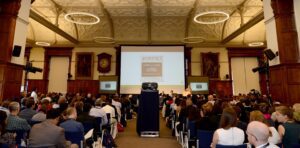 The biennial UKFIET conference aims to stimulate critical dialogue between actors across the globe involved in improving participation in education for all. The 2017 conference fully achieved this mission, bringing together over 750 participants (50% women) from 61 countries, including officials from 5 national Ministries of Education in the global south, for 3 days of vibrant exchanges and mutual learning. Success was reflected in the responses to the conference survey – the conference experience met or exceeded the expectations of 90% of respondents.
The biennial UKFIET conference aims to stimulate critical dialogue between actors across the globe involved in improving participation in education for all. The 2017 conference fully achieved this mission, bringing together over 750 participants (50% women) from 61 countries, including officials from 5 national Ministries of Education in the global south, for 3 days of vibrant exchanges and mutual learning. Success was reflected in the responses to the conference survey – the conference experience met or exceeded the expectations of 90% of respondents.
The 2017 Conference theme, ‘Learning and Teaching for Sustainable Development: Curriculum, Cognition and Context’ and six associated sub-themes proved highly popular, attracting 380 abstract submissions. Following peer review and feedback by the theme convenors, 250 proposals were accepted for the 3 days, including 28 symposia and 73 quickfire presentations (short 7 minute accounts of new ideas, projects or key findings) in addition to 167 papers (15 minute presentations).
Presentations were organised by theme into 80 sessions across the 3 days. Framing these sessions were 3 plenary sessions, all with a different format and involving a range of distinguished speakers. The diversity of these sessions meant that most conference participants enjoyed at least one aspect of these sessions.
Workshops were introduced to the conference programme for 2017. The 11 workshops focussed on topics such as advocacy for girls’ education, the next GEM report, promoting research in the media and a dance masterclass. Participants were able to pre-book their place using the Conference App. The workshops were well attended and feedback was enthusiastic, participants welcomed these opportunities for more in-depth exploration of specific topics and peer interaction.
A further successful innovation was the deployment of a Conference App. Through this, participants were able to access an up-to-date version of the conference programme with presentation abstracts, a platform for networking and plan personal schedules. Following the conference presentation, slides and 40 additional cases studies/ papers/ blogs were made available through the App. Participant response to the App was highly positive; there were 631 downloads, 368 personal profiles created and over 16,000 session views of the conference programme.
The conference committee (17 members drawn from diverse institutions and organisations) were augmented by a group of 9 rapporteurs. These post-graduate students/ early career professionals offered a fresh perspective on the conference and were invaluable in documenting the sessions and helping to fix minor technical issues – the latter task was not part of their official role! Under the guidance of the UKFIET Engagement Fellow they produced a daily conference newsletter summary and contributed to the ‘writing walls’.
The conference hosted celebrations to mark the start of BAICE’s 20th anniversary, including workshops, an evening reception and innovative debate, in addition to the traditional BAICE Presidential address – the latter introduced through non-traditional participatory dance.
The conference used Twitter as the main social media platform before and during the conference and this was integrated into the App. This continues to be a popular way of engaging with the participants and others in the network. The website was busy with new content in the lead up to the conference. Following the conference there have been a steady flow of blogs going online – these include summaries of the conference sub-themes, think pieces from bursary recipients and other participants, and additional contributions from others in the network.
Despite the record attendance and unfavourable weather, the new streamlined catering arrangements successfully reduced over-crowding and queuing during the breaks and this was appreciated by participants. There were some adverse comments on the food choices and packaging but more critical, perhaps, the challenges with technology in many rooms.
The full conference report offers a number of detailed recommendations for the UKFIET 2019 Conference, including expanding the number, interactivity and range of workshops, improving technical support, developing the App to offer more timely access to the presentations and papers, and changes to the catering arrangements.
A copy of the full conference report can be obtained from info@ukfiet.org
